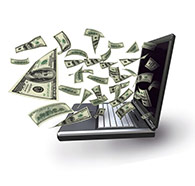НАВИГАЦИЯПОПУЛЯРНЫЕ СТАТЬИ
|
05.10.2007 23:39 Statistics service said Russia`s inflation at 7.5% in Jan-Sep 2007 Consumer price inflation in Russia amounted to 7.5% in January-September, the Federal State Statistics Service said. Consumer price inflation in September amounted to 0.8%. Core inflation, which eliminates the influence of one-time events, administrative actions and seasonal fluctuations, amounted to 6.7% in January-September and to 1.6% in September. In January-September, prices of services rose 11.6%, prices of manufactured goods rose 4%, prices of foodstuffs rose 8.1%, and prices of foodstuffs, excluding fruit and vegetables, also rose 8.1%. In September, prices of services rose 0.4%, prices of manufactured goods rose 0.8%, prices of foodstuffs rose 1%, and prices of foodstuffs, excluding fruit and vegetables, rose 2.2%. In Moscow, inflation was at 0.5% in September and at 6.8% in January-September, while in St. Petersburg inflation was at 0.5% in September and at 8.1% in January-September. In 2006, consumer prices rose 9%, which was on the government`s target for the year. The government`s official inflation forecast for 2007 is 8%. 02.10.2007 22:24 Expansion of Global Manufacturing output hit twenty-five months low in September Global manufacturing growth fell sharply in September as new orders growth cooled dramatically, a global indicator based on national surveys of manufacturers showed. The indicator, produced by JP Morgan with research and supply management organisations, fell to 52.3 in September from 53.1 in August, its lowest level in just over two years. Production growth hit a 22-month low in the euro zone, while it cooled to its lowest since March in the United States. The global new orders index fell to a 28-month low of 52.5 from 53.9 in August, with the euro zone particularly hard hit. "Manufacturers appear to be responding to slower demand growth and credit market tightening by curtailing the growth of new orders and inventory," said David Hensley, director of research at JP Morgan. The employment index rose marginally to 52.2 in September from 52.0 the previous month, with hiring up across all major economies. The index combines survey data from countries including the United States, Japan, Germany, France, Britain, China and Russia. 29.09.2007 12:05 U. S. consumer sentiment remains low in September The Reuters/University of Michigan Surveys of Consumers found U. S. consumer sentiment essentially unchanged this month, at its lowest level in 13 months, as lower gasoline prices failed to buoy an economy weighed down by the credit crunch and real estate slump, according to Bloomberg News. The surveys` final index of consumer sentiment in September was 83.4 points (2000 = 100 points), edging down slightly from this month’s preliminary reading of 83.8 points and the August reading of 83.7 points to its lowest level since August 2006. For the first eight months of the year, the average reading was 83.9. The index had been expected to rise to 84 points, according to the median forecast of 58 economists surveyed by Bloomberg News. The Reuters/University of Michigan current conditions index – reflecting Americans` perceptions of their own current finances – fell to 97.9 points from last month’s 98.4. But the surveys` expectations index – reflecting consumers` view of the economy in the months ahead – rebounded slightly, rising to 74.1 points this month from 73.7 in August. 28.09.2007 21:37 Russia`s GDP surged 7.7 percent in January to August, IP grew 7.0 percent Russia`s GDP grew 7.7 percent in January to August of this year vs. 6.2 percent a year earlier, signaled the survey of current economic situation elaborated by the RF Economic Development Ministry. Russia`s economy maintained the accelerating rates in summer, though the pace slowed down in August vs the speed manifested in May through July. The August growth in GDP was just 6.4 percent. Less seasonal and calendar factors, the monthly growth in GDP was still rather high (0.7 percent a month on average from January through August of 2007). The economy accelerated on high rates of investment growth, construction, consumer demand coupled with increasing impact of imports in meeting domestic demand in the environment of some slowdown in processing industries and exports. Russia`s industrial production grew 7.0 percent in Junuary to August compared to 4.3 percent a year earlier. In August industrial production grew only 3.8 percent. Economic Development Ministry also provided the inflation estimate for January through September, saying the inflation was 7 percent to 7.1 percent during the period. Consumer inflation went down to 0.1 percent in August because of the seasonal drop in prices for fruit and vegetables from 0.9 percent to 1 percent posted in June through July. The inflation was 6.7 percent from early this year (vs. 7.1 percent a year ago) and 8.6 percent for a year`s period (August 2007 to August 2006). At the same time, the external surplus of Russia shed 17.9 percent on year to $82.1 billion in January through August 2007. Exports reached $216.9 billion, while imports stood at $134.8 billion. 27.09.2007 21:28 US economic growth in Q2 2007 revised down to annual rate of 3.8% from earlier estimate of 4.0% The US economy grew at an annual rate of 3.8 percent in the second quarter, following 0.6-percent growth in the first quarter, according to the "final" estimates released by the Bureau of Economic Analysis. The second-quarter growth rate was revised down from the "preliminary" estimate of 4.0 percent. The acceleration in real GDP growth reflected upturns in net exports, Federal government spending, and inventory investment; an acceleration in business investment; and a smaller decrease in residential home investment. In contrast, consumer spending decelerated sharply. The downward revision to GDP growth reflected updated estimates of net exports and business spending for structures; both were smaller than previously estimated. In contrast, business investment in equipment and software was higher than previously estimated. 24.09.2007 22:32 Russia`s Economy Ministry increased the 2007 GDP forecast to 7.3 percent Russia`s Economy Ministry predicts stronger GDP growth for 2007-2010. The 2007 GDP forecast increased to 7.3 percent, up 0.8 percent. According to new estimates, Russia`s economic growth is projected at 6.4 percent in 2008, 6.0 percent in 2009 and a 6.3 percent rise is forecast for 2010. Acting First Deputy Prime Minister Alexander Zhukov said that Russia`s gross domestic product in 2007 will grow by more than 7.5 percent. Speaking at the 6th International Investment Forum Sochi 2007 on Saturday, Zhukov said the average annual GDP growth in 2000-2006 was 6.8 percent. In his words, the high economic growth over the past several years was accompanied by "a sustainable budget surplus" and the sevenfold increase in the state`s expenditures. All this and purposeful policy of the state have created favourable conditions for foreign investments in the country. "Over the first seven months of this year investments in fixed capital in the Russian economy was 23 percent, and over 60 billion U. S. dollars were attracted in foreign investments in the first half of the year, which is almost three times more than in 2006", Zhukov said. He stressed that investment demand had grown most intensively in industry, construction, and high-tech industries. In his view, Russia has reserves to improve the investment climate, including by perfecting tax administration, antimonopoly legislation and ownership rights legislation. 18.09.2007 21:39 IMF has cut US 2008 GDP forecast to 2.2 percent from 2.8 percent The International Monetary Fund has sharply cut its forecast for 2008 economic growth in the United States and made a more modest reduction in its outlook for the euro zone, Italian news agencies reported on Tuesday. Citing a draft version of the IMF`s Economic Outlook to be released next month, news agency AGI said the IMF slashed its 2008 U. S. growth forecast to 2.2 percent from 2.8 percent, largely due to the fall-out from the crisis of the subprime mortgage sector. The IMF`s forecast for the euro zone has been trimmed to 2.3 percent from a previous 2.5 percent projection, AGI and several other Italian news agencies reported. The IMF`s growth forecast for Germany was cut to 2.2 percent from 2.4 percent, the agencies said, while France`s growth was left unchanged at 2.3 percent and Italy`s was trimmed to 1.6 percent from 1.7 percent. The IMF left its forecast for this year`s Italian growth at 1.8 percent. 14.09.2007 21:25 US Industrial Production Rose 0.2% in August on Utility Gain Production at U. S. factories, mines and utilities edged up in August at the slowest pace in three months. The Federal Reserve reported that industrial production was up just 0.2 percent in August. That was slower than the 0.3 percent gain that analysts had been expecting. It was the poorest performance in three months and reflected a 0.3 percent drop in output at U. S. factories, the first decline in manufacturing after five straight increases. The 0.3 percent gain in industrial output followed much stronger increases of 0.5 percent in July and 0.6 percent in June. The drop in manufacturing output was accompanied by a decline of 0.6 percent in mining, the category that includes oil production. These declines were offset by a 5.3 percent surge in output at U. S. utilities, reflecting a hotter-than-usual August. Capacity utilization, measuring the proportion of plants in use, held at 82.2 percent in August, the Fed said. 12.09.2007 21:13 Industrial production in the Eurozone expanded 0.6% in July; Up 3.7% in 12-month period In July 2007, compared with June 2007, seasonally adjusted industrial production increased by 0.6% in the Eurozone (EA13) and by 0.4% in the EU27. In June production remained stable in the Eurozone and grew by 0.1% in the EU27. In July 2007 compared with July 2006, industrial production grew by 3.7% in the Eurozone and by 3.5% in the EU27. These estimates are released by Eurostat, the Statistical Office of the European Union. In July 2007 compared with June 2007, production of capital goods increased by 1.0% in the Eurozone and by 0.7% in the EU27. Intermediate goods grew by 0.5% in both zones. Non-durable consumer goods rose by 0.3% in the Eurozone and by 0.2% in the EU27. Energy gained 0.1% and 0.7% respectively. Durable consumer goods fell by 0.1% in the Eurozone, but remained stable in the EU27. In July 2007 compared with July 2006, production of capital goods increased by 6.3% in the Eurozone and by 6.1% in the EU27. Intermediate goods grew by 3.7% and 3.6% respectively. Non-durable consumer goods rose by 2.9% in the Eurozone and by 2.3% in the EU27. Durable consumer goods gained 1.8% and 3.5% respectively. The energy sector fell by 0.4% in the Eurozone and by 0.1% in the EU27. |
Цитата дняБольшинство людей начинают интересоваться акциями, когда все остальные интересуются. Время интересоваться — это когда никто другой не интересуется. Вы не можете купить что-либо популярное и выиграть от этого. |




 07.10.2007 13:08 Euro zone GDP growth is expected to be 2.6 percent in 2007 France`s statistics office Insee said it now sees euro zone GDP increasing by 2.6 pct in 2007. Insee`s forecast was the same with economist`s expectations and just under the European Commission`s and IMF`s estimates. The IMF`s forecast for the euro zone was trimmed to 2.3 percent from a previous 2.5 percent projection, the news agencies reported last week. The European Commission last week lowered its forecast for 2007 euro zone growth to 2.5 percent from 2.6 percent due to a weak second quarter and a preliminary assessment of the impact of the market turbulence since August. The Commission said the turmoil on financial markets "could imply a more marked deceleration" in 2008. The European Commission (EC) also expects that euro zone GDP growth will be 0.5% q/q in the third and fourth quarters. The EC said that economic fundamentals are still sound and the global business environment remains supportive. The EC added that the effects of the credit crunch are likely to felt only next year.
07.10.2007 13:08 Euro zone GDP growth is expected to be 2.6 percent in 2007 France`s statistics office Insee said it now sees euro zone GDP increasing by 2.6 pct in 2007. Insee`s forecast was the same with economist`s expectations and just under the European Commission`s and IMF`s estimates. The IMF`s forecast for the euro zone was trimmed to 2.3 percent from a previous 2.5 percent projection, the news agencies reported last week. The European Commission last week lowered its forecast for 2007 euro zone growth to 2.5 percent from 2.6 percent due to a weak second quarter and a preliminary assessment of the impact of the market turbulence since August. The Commission said the turmoil on financial markets "could imply a more marked deceleration" in 2008. The European Commission (EC) also expects that euro zone GDP growth will be 0.5% q/q in the third and fourth quarters. The EC said that economic fundamentals are still sound and the global business environment remains supportive. The EC added that the effects of the credit crunch are likely to felt only next year. Автор:
Автор: 
 Комментарии: 0
Комментарии: 0 Просмотров: 21
Просмотров: 21


